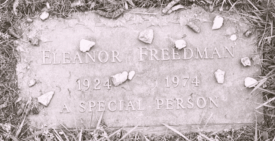
Kate Inglis
Happy new year!
He is still gone.
Best wishes for a terrific new year!
Why am I the only one who remembers him?
Political galvanization, physical fitness, social activism? Less clutter, more hydration? More kale chips, less bourbon? How about tightening up that winter blues belly? What’s your #wholenewyou? Comment here for your chance to win our essential oils kit and companion booklet: ‘Manifesting Your Whole New You’!
Oh fuck off.
+++
It’s almost incomprehensible to move through the ruthlessly unchanged world after your baby—or any human precious to you—dies. This is the cruelest of the post-loss sentence. Everyone else still runs for the bus, drops a half-full latte on the sidewalk and curses, spends days agonizing over what to wear to a job interview.
And there you are.
My (___) is dead
Oh god, it happened
My god
My (___) is dead
Everyone watches me
Nobody sees me
Everyone is leaving me alone
Nobody is leaving me alone
In grief, we become a sort of public property that belongs to everyone, but that nobody wants. Like a stray dog in the town square.
Ugh
That poor mangy thing again
Leaking and bitten all over from fleas and street fights, fur falling out in patches, burrs tangled up tighter and tighter, pinching. Barely-living proof of creatures falling through cracks in a society that disavows the existence of cracks.
That dog should go somewhere else
That dog is an eyesore
Someone should do something
Hmph
They move along, pulling their children close, running for buses and fretting over coffee and job interviews. They move along.
+++
I know how it is to be that dog. Maybe you do, too. So fine, then. Alright.
Simply by existing, we remind people of the terrifying randomness of being human, the package deal of being clever enough to know the jig will, eventually, be up. I don’t relish being the reminder any more than I relish being reminded.
But when something sucks irreversibly, we can reconcile that something a little more if we do it in parallel. We can’t change it, but we can talk to each other about not being able to change it—and by doing so, we change how it feels to exist in the middle of all this unchangeable suckness. I’ll hold on while you go back and read that again, slowly. It’s a small but mighty consolation.
We pass each other on the street, sit next to each other at concerts and potlucks, perhaps never knowing. Sometimes, sitting with a plate of barbecue on your lap, you might blurt out something you generally try not to, and the person next to you doesn’t flinch but puts a hand on your forearm and says Oh my god, you too? Uncooperative bodies and recurring nightmares, c-section scars, syringes full of gonadotropins for polycystic ovaries, urns we can’t imagine either keeping or dispersing. All that or dead sisters, brothers, lovers, parents, friends. All the ones who shouldn’t be—which is, of course, all who were ours.
We are us.
+++
What is the new year to someone in grief? What are we to vow and manifest? What shape can optimism take when we can barely manage breakfast?
I humbly submit New Years’ Resolutions for The Emotionally Infirm, The Crushed, and The Weary:
1. Worry less about how well or not-well you are performing your grief. This is your own private, ongoing (wracked, unreconciled, agonized) conversation with death. Nobody else gets a ticket to it—peanut gallery or otherwise—unless you give them one.
2. Pay more attention to who and what you’re paying attention to. Chances are good that in many cases, you’re wasting your attention, which is a precious and finite commodity. Resolve to invest it carefully. Shrug more.
3. Take care of your pain instead of trying to make it presentable. It’s a big change, thinking of it like this. We are supposed to grit our teeth in the face of pain, bearing it with an unbending kind of resilience. Despite all that happened, she hasn’t changed. She is positive. She is still herself. Blessings! Huzzah! What would taking care of your pain look like? Like allowing it to be pain. Normal, ordinary pain that is the by-product of abnormal, extraordinary loss. Before it ebbs, it has to rage. Anything else is a lack of health.
4.…
…There’s lots more you could resolve to do more or less of, profound or vain, from big life change to facial exfoliation. Whatever is fourth, fifth, or sixth is unique to you. In grief, the first three matter most, adding up to this:
Be where you are, darling. Start here, and try again tomorrow. That’s all.
When Kate Inglis’s twin boys were born prematurely, one survived and the other did not. Her book—Notes for the Everlost: A Field Guide To Grief—is part memoir and part handbook for the heartbroken, a powerful, unsparing account for all who have been bereaved and are grieving, offering a beacon as we practice integrating loss into life. Lead image is a self portrait of the author.








